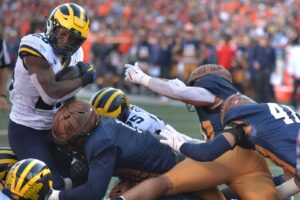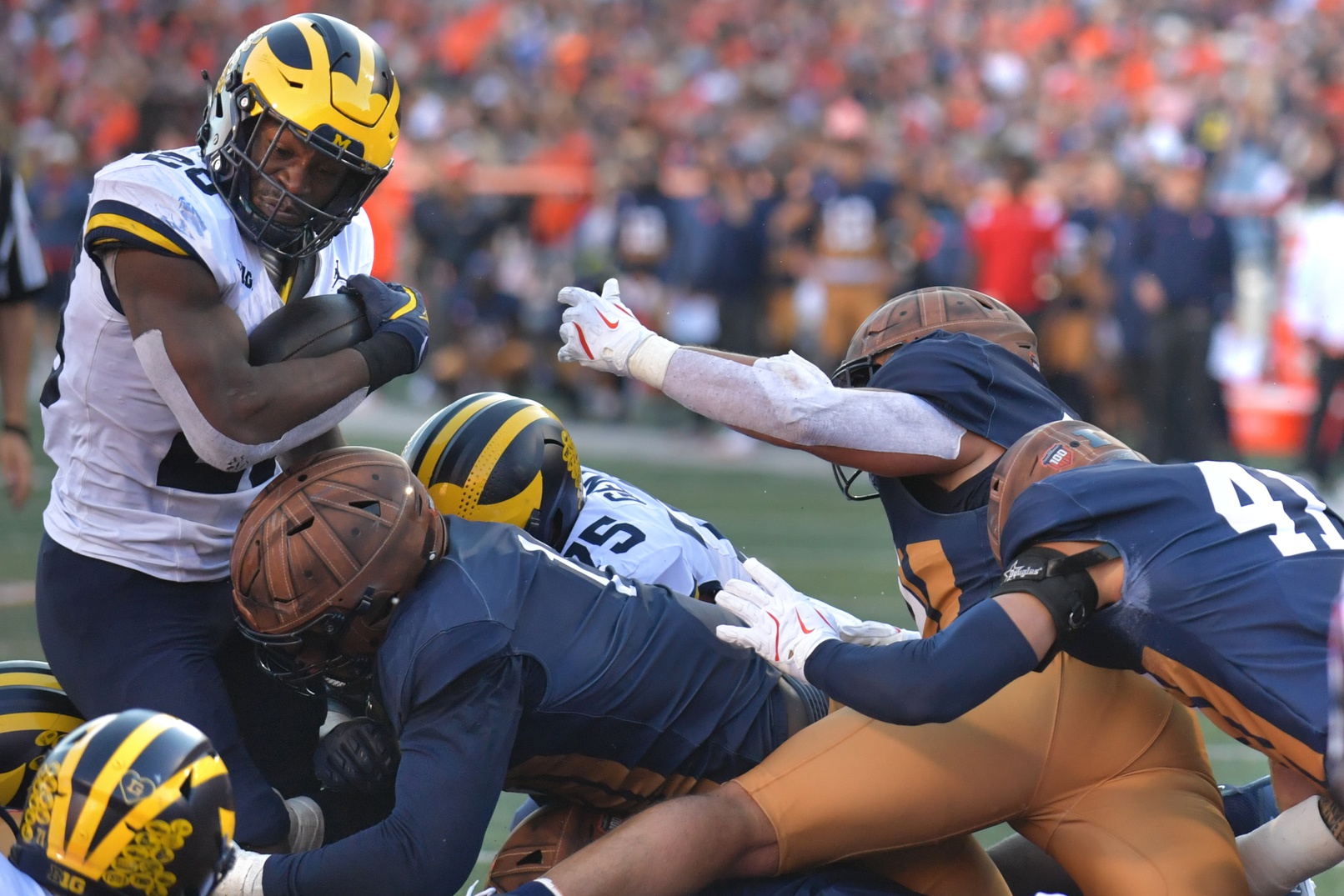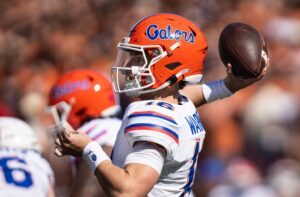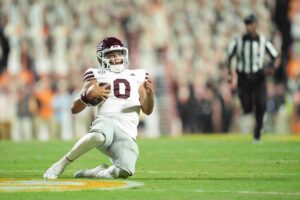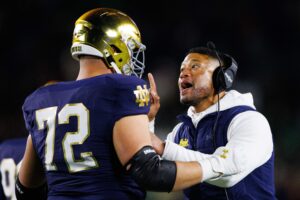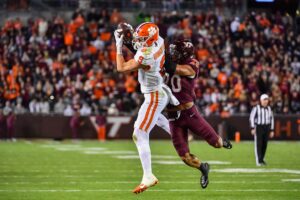Two weeks. Michigan football had two weeks to recover from their fiasco in Seattle and prepare for a rebound in Champaign. Let’s just say the game was PITIFUL. Illinois had just given up 49 points to Purdue. The Boilermakers are currently 1-6 and dead last in the Big Ten. The Wolverine offense is being discussed in the same breath as Kennesaw State, which joined FBS football this year.
This team needs to figure out who they are, what they can do, and how they can do it. That starts with coaching decisions on the offensive side of the ball.
Why Can’t Michigan Do Offense?
In short, the coaches aren’t scheming well, the players aren’t executing well, and the roster construction (the quarterback room in particular) does not indicate much chance to mitigate that.
Outside of the final all-passes drive to end the game, Michigan had 27 plays on first downs. Offensive coordinator Kirk Campbell called passes on 19 of those vs. eight runs. Whether those first down passes worked (some did, most didn’t) is immaterial on a team that has Kalel Mullings and Donovan Edwards. Edwards had a brutal fumble in this game, but otherwise, the two combined for 125 yards on 26 carries, good for 4.8 yards a pop. At that success rate, handing the ball off on every play is at least a theoretically viable path to victory. It might not be exciting, but it’s a win.
Instead, we watched Campbell get cute and try to lean on a quarterback shaking off rust while clearly still recovering from a UCL (elbow) injury. Tuttle threw 32 times and dropped back for five more attempts that turned into sacks. Why ask your seventh-year oft-injured transfer quarterback to shoulder that load? Moreover, why do that when you have two great running backs and an offensive line that run blocks heaps better than it pass blocks? Mullings should have 25+ carries a game, with another 10-15 for Edwards. Play them together, run them often, and slog out a few ugly wins.
We don’t know what’s going on in practice, sure, but we’ve watched the games. Good coaches build offenses around the parts that work. Campbell’s inability to do so is a massive hindrance, one that doesn’t look fixable in 2024.
Scheme, Execution, Discipline
This coaching staff either has no interest in a more conducive scheme, or worse, they don’t know how to go about installing one. A better offensive setup for this personnel group probably looks like what’s happening at Vanderbilt or the service academies – option-heavy game plans that get creative with the running game and use motion/misdirection to find open gaps, keep the ball, and control the clock. Passing? Only when necessary, and least expected.
Outside of a better scheme, Michigan doesn’t have the players they need to run what they want. The whirligig at quarterback has collectively thrown for 128 yards per game (and 5.4 yards per completion) and nine interceptions. They’ve taken 13 sacks. They’re throwing an alarming number of passes behind, beyond, and below intended receivers.
Those receivers, outside of Colston Loveland, have 65 catches for 554 yards. In seven games. That’s an average of NINE non-Loveland catches per game. The offensive line finally replaced the worst-graded power-conference tackle (Evan Link) after six games. That it took six games to do so turns this conversation back on the coaching staff, which we would be talking in circles.
There are a number of draining stats about this team, but one in particular highlights their lack of poise as compared to 2023. Penalties. Last year’s team took 45 penalties for 412 yards in fifteen games. This year, in seven, they’re already at 35 penalties for 349 yards. That of course includes offense and defense, but is nonetheless indicative of an overarching theme: this year’s team has been less disciplined.
A Hat Tip To The Defense
Briefly, the defense has still largely done its duty. They have at times looked lost trying to figure out Wink Martindale, just as he is clearly still trying to figure out the college game. But they just held a previously competent Illini offense under 300 total yards, including 80 yards passing. And that was without star corner Will Johnson.
They managed to look like an echo of last year’s team, in that the box score had plenty of contributors. Ten different players got in on tackles-for-loss, and four got pass deflections. We saw several younger players get meaningful snaps as the coaches started to plan for life in 2025 without their stars. Safety Mason Curtis showed up and popped a bit, in part because he’s 6-foot-5 and playing safety. In Rayshaun Benny’s absence, walk-on Chibi Anwunah got some work in the middle of the defensive line and didn’t look out of place.
They still got beat a few too many times, took some avoidable penalties, and showed their youth. Still, the first team remains one of the most talented units in the conference, if not in the country, and there are pieces on the depth chart that look promising for future iterations of Michigan football. An even mildly compelling offense could pair with this unit and get to 8-4 with relative ease. Alas.
A quick note on special teams: something is off with Tommy Doman. His punting appears to have dropped off a cliff. It’s worth monitoring, as this team will need to win the field position battle to stand a chance against the rest of the schedule.
Moore’s Moment With The Man In The Mirror
The Wolverines must now turn and face their (secondary) rivals up I-96. Two months ago, most fans on either side would have called this a Michigan victory, begrudgingly or not. Instead, Ann Arbor is reeling and the Spartans are fresh off a surprising, resounding win over Iowa, with Aidan Chiles rounding into form and Jonathan Smith’s year one looking more respectable than anticipated.
For Sherrone Moore, it’s a major turning point in his first year. History is not on his side. The last Michigan head coach to beat MSU in his first season was Bennie Oosterbaan…in 1948. Tossing aside that historical context, what really matters is that we see signs of life. The 2021-2023 teams could take punches, get knocked down, and find ways to fight back. Moore was part of those moments, and often instrumental in them (see: Penn State Game, 2023).
It’s a tough job, taking over after a National Championship, but Moore can still salvage this season. An ugly loss to Sparty would only increase the calls for action of some sort. It would be heartening to see him do more than just acknowledge that the team needs to do better. Perhaps that’s taking the sticks from Campbell and piloting the offense himself. Perhaps that’s moving on from Campbell altogether. It all starts with Moore taking a good long look at himself and finding a path forward.
